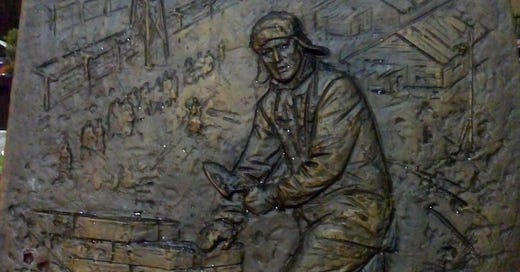George Orwell is famous for many reasons. His most popular legacies include literal communist pigs and constant surveillance as a sign of tyranny. The next time your step-dad rants about “thoughtcrime,” say a prayer for Orwell, who never knew what havoc he would wreak. As an essayist—and for me, the essay is Orwell’s medium—he is partially famous for insisting that, “All art is propaganda.” The line is buried in a novella-sized piece about Charles Dickens, and features a much less renowned follow-up: “On the other hand, not all propaganda is art.”
Orwell insists that every novel has a message, a moral, even a tangled series of morals, that are meant to convince. He doesn’t think the novel should be a pamphlet. Rather, all narrative writing has a point of view, or privileges a point of view, and there cannot be a coherent point of view without some semi-coherent theory of the world, of power in the world. It’s possible Orwell means, or meant at one point in his life, that you could usefully reduce a writer like Jane Austen to a secret political subtext, but I don’t think so.
In fact, Orwell takes a more or less scorched-earth approach to the perils of partisan hackery, to say nothing of myopic, Stalinist hermeneutics. “Everything in our age,” he insists in “The Prevention of Literature,” “conspires to turn the writer, and every other kind of artist as well, into a minor official, working on themes handed to [him] from above and never telling what seems to him the whole of the truth.” The tone is cool (Orwell, we must forgive him, is very British), but the devastation of the opposing side is meant to be total. “The enemies of intellectual liberty always try to present their case as a plea for discipline versus individualism. The issue truth-versus-untruth is as far as possible kept in the background.”
Whatever his failings as a journalist, or his even more obvious formal wobbles as a novelist, Orwell sincerely believes that reality unmasked is the only worthwhile subject of literature. Unfortunately, the “political writing in our time,” he fumes, “consists almost entirely of prefabricated phrases bolted together like the pieces of a child's Meccano set. It is the unavoidable result of self-censorship. To write in plain, vigorous language one has to think fearlessly, and if one thinks fearlessly one cannot be politically orthodox.”
I don’t want to sound like your step-dad, and I don’t think Orwell does either, but I find his indictment of self-censorship convicting and invigorating. Sensitivity readers are currently making a mockery of literature at the behest of Mammon, conservative governors are placing shackles on educators that more or less include banning To Kill a Mockingbird, and I can’t remember the last time I heard news from the YA book world that didn’t include some cross-eyed, identitarian meltdown.
These are not equal impulses, or equal levers of power, but they stem from exactly what Orwell diagnosed.
Let me turn, then, to one of the greatest political novels of the 20th century. One Day in the Life of Ivan Denisovich, by Aleksandr Solzhenitsyn, carries a legacy only rivaled in America, arguably, by Uncle Tom’s Cabin.1 It was the first piece of fiction to depict life in a prison camp that was approved by the Communist Party for publication. The latter only occurred because Khrushchev was attempting to smear Stalin; most top party officials opposed him. The story was a sensation, and much how Abraham Lincoln supposedly told Harriet Beecher Stowe that her book “started this great war,” Russians still point to Solzhenitsyn’s story as the beginning of the end of the USSR.
The narrative wonder of Solzhenitsyn’s tiny tome, though, is that it depicts a pretty good day, gulag-wise.2 After failing to skip out on work, Shukhov3 marches to his assigned construction site. It’s not 40 below outside, so there’s no avoiding hard labor, but that also means the day has shape, goals, camaraderie. Shukhov glows with artificial purpose by the time he’s finished laying mortar. While every decision he makes is about slightly increasing his chances of survival—strong workers sometimes get extra food, being friends with the intellectual prisoner means a share of family care packages, etc.—he succeeds on most fronts. He doesn’t freeze, he doesn’t get punished brutally, he’s less hungry than he’s been in some time.
The moral clarity of the novel is built, in other words, on avoiding even the possibility of horror porn, of something like Holocaust tourism. It is, by and large, a decent twenty-four hours for Ivan Denisovich! But the fragility of this near-happiness is the entire tension of the plot. Shukhov and others constantly discuss the kind of prisoner that survives, the kind that dies. The darker elements of the prison camp are an ever-present canyon over which Shukhov must high-wire walk.
The strongest arguments always enfold, from the outset, the objections of one’s opponents.4 “The gulag prisons aren’t so bad!” some idiots probably said in the 1950s. “The prisoners are involved in productive work essential to the nation, they’re fed, their sense of belonging increases across social strata, and they aren’t even forced into the worst of the cold.” Yet by merely presenting the moral whole, Solzhenitsyn ensures that Shukhov’s preoccupation with survival is unassailable. He is very much not in a kind of All Quiet on the Western Front of gulag life, which makes the cruelty of his precarious state systemically damning. If this is a good outing, imagine the hell of any day even a little worse.
The novel’s final paragraphs are an exclamation point on this thesis. “The end of an unclouded day. Almost a happy one. Just one of the 3,653 days of his sentence, from bell to bell. The extra three were for leap years.”
For Solzhenitsyn, the plain truth convicts the USSR. With no fireworks of pain, no ranting, he delivers a partisan pan by way of careful objectivity. He doesn’t put his thumb on the scales, doesn’t cherry-pick the worst of the brutalizing (which would be justified, actually!), but settles for showing the whole of the terror in simple garb.
I wish every American writer who believes fiction is a handmaiden to their own politics could be knocked sensible by Solzhenitsyn’s level-headedness, to say nothing of Orwell’s. If the horror is there, give it to us whole and plain. If you are writing a novel, what’s more, give it to us however you’d like, just so it’s shaped by the formal freedoms of long fiction, and not a cut and paste of company jargon.
This newsletter is not meant to be an op-ed. Do not email me your op-ed. I just love great novels, and want to point out that great political novels exist, despite how shrill, and numerous, their lesser kin continue to be.5
On to what really matters:
Writing:
Never too late to read my short story in Electric Literature.
This isn’t my writing, but my buddy Bill Coberly recently had a piece on Connie Willis in The Bulwark. It’s very good. Watch this space for more on Willis.
Reading:
The Internet Is Not What You Think It Is, by Justin E.H. Smith
The best part of the book is the chapter which derives from an essay he published with The Point magazine (which I recommend!). It’s kind of all over the place after that, but frequently rewarding in spite of the slipshod organization.
Macbeth, by W.S.
Let me be the first person ever to tell you: Shakespeare is good.
I love you all.
I feel bad for making this comparison. Solzhenitsyn’s a much, much better writer.
Did you know GULAG is an acronym? It’s taken on a life of its own, but it referred originally to the government ministry that oversaw the “correctional camps.”
The title character’s surname, and how he’s referenced throughout the work.
I think there’s a name for this idea in philosophical circles, or maybe the debate world, but if I ever learned it, I’ve long forgotten.
Arguably, Trust Exercise by Susan Choi is the great #MeToo novel, though it wasn’t written with that movement specifically in mind, I’m pretty sure. It’s certainly one of the great novels of the last decade, in my opinion. Or at least one of the few contemporary literary novels (last five years) I’ve read and which I think about regularly.





Dense layers of interesting implications leading to overall recognition of the reality of the horror of such a life experience
Good piece, and not just because you gave me a shoutout at the end!